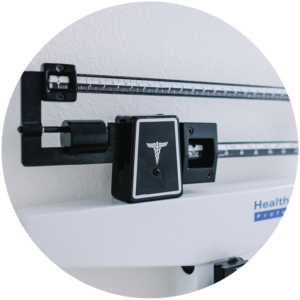Close


What is obesity?
Obesity is an abnormal or excessive accumulation of body fat. It is a health risk.
How do I know if I am obese?
While body weight is expressed in kilograms, healthy weight is expressed as a number that takes into account both weight and height. This number is the body mass index (BMI), which is calculated by dividing weight in kilos by height in metres squared.
For example, an individual who weighs 75 kg and is 1.83 m tall has a body mass index of 75 / (1.83)², or 22.4 .
An individual’s cardiovascular risk increases as soon as his or her BMI exceeds 27, and the higher the BMI, the greater the risk. Achieving and maintaining a healthy weight through a combination of physical activity and a healthy diet is an effective way to reduce cardiovascular risk.
What are the causes of this?
The two major causes of obesity are :
Obesity and its companion physical inactivity are probably the two most prevalent risk factors in industrialised countries.
Currently in Belgium, almost one adult in two and one child or adolescent in five have a weight that constitutes a threat to their heart. Moreover, unfortunately, all indicators are in the red and all data agree that the already worrying situation will get worse.
In Belgium, the average BMI of the overall population is just on the borderline of overweight (24.9 kg/m²).
Why is this serious?
Obesity is an insidious enemy, on the one hand it is a cardiovascular risk factor in its own right, on the other hand it favours the occurrence of other risk factors, in particular blood fat disorders and type 2 diabetes.
People who are overweight or obese are more likely to have high blood pressure, high cholesterol or diabetes, and the existence of these risk factors increases their likelihood of heart and cerebrovascular problems.
What treatments?
Too much food and too much exercise are the two main causes of obesity, so getting back to a varied, healthy and sensible diet and engaging in exercise whenever possible are the ways to regain a healthy weight.
The number of kilos to be lost in order to return to a healthy weight obviously depends on the initial weight, but it is important to know that a weight loss of 5 to 10% already has positive effects on cardiovascular health insofar as abdominal fat, which is the most harmful to the cardiovascular system, is the first to decrease in a person who loses weight. A weight loss of 5-10% often returns blood sugar and cholesterol levels to normal. When an individual recovers a BMI < 27, the increased risk of obesity disappears.